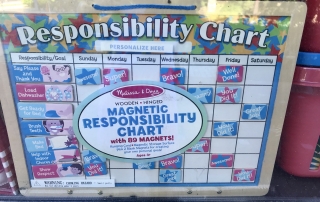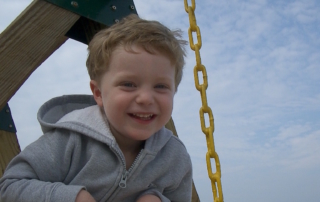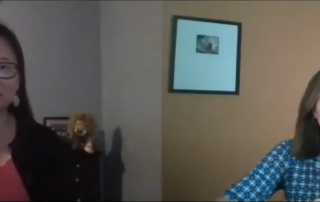Regina's Blog
This is a blog about relationships, and it covers dating, marriage, parenting, modern family dynamics and divorce as seen from the very personal perspective of a divorced divorce lawyer.
Practicing Forgiveness, Particularly During COVID-19
Have you found yourself immensely disappointed by others the past few months? If so, you are definitely not alone-- this pandemic is testing everyone's patience in so many ways. None of us are operating at our best right now, which is why now more than ever we need to practice our ability to forgive.Forgiveness is not about excusing someone's transgression or forgetting their bad acts. It is definitely not about allowing yourself to become vulnerable once again or even continuing in a toxic relationship. What it is about is letting go-- making a choice to not harbor resentment, seek revenge or be consumed by anger. The gift of forgiveness is really to yourself, so you can find inner peace and move forward with a far lighter load to bear.When processing your feelings of frustration, try to (1) pinpoint the reason for your pain; (2) understand that person's motives or intent; and (3) weigh all your options for a workable solution. Analyze where this person ranks in your life-- is s/he even worth the effort of you spending time and energy agonizing over the relationship and finding a way to fix things? Also, how egregious was the transgression? And was the trespass intentional or accidental, because that does make a huge difference. Misunderstandings happen all the time, and sometimes even smart people make poor choices or show lapses in judgment. Intellectually we all know this, but it really stings when it hits close to home because unfortunately, we tend to have the highest expectations of our loved ones, which makes them the most likely to profoundly disappoint us. As a result, we need to acknowledge that forgiveness is a key component of love, however, it's not a life skill that is generally promoted in our society, which often tends to view it as a sign of foolishness or weakness. The fact is we need each other to survive, if nothing else COVID-19 has really driven that point home. But we all have different experiences and opportunities growing up, which create varying needs and wants as adults. We will not all make the same life choices, which is actually quite beautiful and yet also creates great complexity in our relationships.For over 20 years, I've seen all my divorce clients struggle with forgiveness, but those that find a way to let go of all the anger and resentment, move on much faster and [...]
5 Tips for Staying Grounded During COVID-19
If you are a planner, someone that is goal driven and likes to have a clear plan of action, and/or like to feel like you are in control (at least in your own life) the past four months have undoubtedly thrown you a bit off kilter. This pandemic is limiting everyone's ability to make plans, and work and finances for many are quite unpredictable right now. So, if you feel unsteady you can certainly take solace in knowing you are in very good company, but an even better course of action is to find ways as minor as they may seem to restore some balance to your life.1. Socialize- Humans are not meant to be alone. Identify a few close family and friends to check in with you regularly. Calls are not enough, so try to find a few that will do socially distant walks with you or small backyard gatherings. I've found this has been a great source of joy even during the most difficult of weeks.2. Exercise- It is important to get outside, breath some fresh air, and work out regularly. Lately, despite not having access to a gym I've been walking 4 miles a day, doing yoga at least 3 days a week, and I even took up golf, which is a nice socially distant sport that I can continue to play much later in life.3. Cook- We all need to eat, and with limited dining out options, now is the perfect time to check out new recipes. There are plenty of online cooking shows or classes. I did a virtual class this week with some friends via Zoom, and it was a blast.4. Relax- It's not healthy to deprive yourself of sleep and some down time. Make sure you stick to a good sleep schedule, and at least one hour before try to unplug and unwind by reading, writing in a journal, or just listening to music and trying some meditation. 5. Stay Positive- Focus on what you do have, practice daily gratitude and if helpful find mantras that will calm you. Lately, one of mine has been this: I did not cause this pandemic, cannot cure it, and don't control it. This helps me let go and just accept that we need to ride out each day as best we can. Hopefully these 5 tips will help you stay grounded during these unprecedented times, [...]
Key Tips for Setting Boundaries
Our boundaries are always being tested-- at work, by our family and friends, and even our exs. Setting limits can be difficult, particularly when it brings up feelings of guilt for us. This is why it is so important to work through those feelings of guilt. We need to realize that creating limits and saying "no" to others is not a bad thing. First and foremost, it is about self-preservation. Boundaries help you protect you, and only you really know how much you can tolerate in terms of a work load, need for sleep, some "me" time, etc. With a partner or relative, another point to consider is that you don't want to let resentment build up. When we take on too much for others, or repeatedly allow someone to avoid consequences, we risk creating an unhealthy dynamic that slowly, but surely will erode the relationship. Speaking up and setting boundaries, can actually help reduce tension and restore balance to the relationship. With former partners, if you share custody of children with them, boundaries are essential to being good co-parents and modeling good behavior for your kids. Setting limits in your communications with exs is also important if you want any chance of finding a decent new partner. Inevitably, there might be some backlash when we try to establish new limits. To clearly communicate our new expectations and work through any feelings of guilt or anger that might bubble up during the implementation process, many people find it helpful to work with a life coach/mental health professional. My final tip is to simply understand that it is a work in progress for all of us. It's not easy to take responsibility for your part, and gently but firmly hold others accountable for their actions, but the key is to not allow your boundaries to collapse. Here is a 9 minute video with life coach, Nicoletta Pichardo, who explains the importance of setting and maintaining boundaries: https://youtu.be/RCoTqy-PP34
Tips On How To Exit Gracefully
When someone makes the decision to leave a relationship emotions can run high, particularly if one person feels blind-sided. For some people, this will trigger anxiety due to their fear of being abandoned and feeling lonely; for others it is the loss of connection that triggers sadness and grief. Some may become consumed by the issue of sunken costs (time, energy, and money spent during the courtship) and they wind up stuck in an angry/negative loop. Maybe it's even the perfect trifecta, which will compromise your ability to think clearly and rationally, and if you act out on your impulses, others will wonder is s/he "crazy or just plain stupid?" (Thank you Forrest Gump for that great line).Sadly, there are no short-cuts, and the only way to regain your equilibrium is to allow yourself to go through the grief cycle-- give yourself permission to experience each stage, and if you feel overwhelmed, reach out for some support throughout the process. In the meantime, here are some tips to help you avoid making some very poor decisions that you will later regret:1. Don't destroy anyone's property, it is after all a crime;2. Don't make any threats, especially about someone's safety;3. Don't call or send any emails/texts in the heat of the moment;4. Don't trespass and show up uninvited at anyone's home or work; and5. Don't try to sabotage a person's career or livelihood.Instead, disconnect with your ex on social media, sever all other ties as neatly as possible and take the high road. As best you can, implement no contact and take down any reminders in your home like pictures or cards (this is understandably much harder to do when you have kids in common). When you ask that person to stop communicating with you, keep it simple. Here is an example of what to say: Unfortunately, I was hoping over the past several weeks that we'd be able to rebuild trust and recover from your emotional infidelity. Thursday's events, however, were the final straw for me. I have nothing else to say, and would appreciate that going forward you refrain from contacting me. This simple message that I once wrote conveys what caused the breakdown and that no further communication should be expected. Your good-bye should not be a dissertation; less is best. If you are not sure the message is clear, run it by a few friends [...]
Is It Really Cheaper To Keep Her (Or Him)?
Over the past two decades, there is one common regret that resonates with most of my divorce clients: they should not have delayed in calling it quits. Many wait too long and put up with way too much mostly out of fear-- either (1) fear of being alone, (2) fear of losing time with their children, (3) fear of social backlash, or (4) fear of the financial hit and change in lifestyle the divorce will inevitably cause. All of these consequences are both scary and real, there is no way I can sugar coat that for anyone, however, if the conclusion is "it's cheaper to keep her (or him)" you are not seeing the full picture. To appreciate the full view, you need to see it from my perspective, as someone that has lived through the experience and helped thousands as a divorce attorney face these fears head on in order to find a better life on the other side. The reality is the longer you stay in an unhappy situation, the greater the risk to your mental and physical health, and perhaps your children's wellbeing if they are being exposed to a toxic situation at home. You also run the risk of being more on the hook for spousal support based on the standard of living and length of the marriage if there's a discrepancy in incomes. Furthermore, as your assets continue to grow, so does your exposure of having to potentially forfeit half if things end in divorce. And, most importantly there is the opportunity cost that cannot be quantified-- the longer you stay, the less time you will have later to find someone more suitable. Once the full cost/benefit analysis is completed, and an individual can acknowledge that the pain of staying is too great while all hope of remedying the situation at home is lost, that first critical step towards making a change has been accomplished. The next step is usually to get professional advice and understand the tasks that will be required to un-tie the knot. Having both a guide and a clear roadmap will make the journey substantially less daunting, but it will still take time and effort to work through the fears that surface when working through the details of a split. Let's tackle them here, together: Fear of being alone: While you may be alone for a little while until you [...]
Tips For Helping Children During High Conflict Court Battles
High conflict divorce or custody battles in court are the worst, particularly for the children involved. Despite the fact that all the research shows the children are best served when their parents spare them of their conflict, inevitably about 20% of family law cases end up being flagged as high conflict, with the parents offering very different versions of what they believe is best for their children. When this happens, unfortunately the court often needs to get experts involved to get past the he said/she said problem and break the impasse. One option is to ask the court to order a neutral mental health professional to conduct a custody evaluation. After meeting with the children, their parents, and other key figures in the children’s lives, the custody evaluator will make a recommendation as to the best custodial arrangement for the kids. While these recommendations are not automatically binding, they carry substantial weight with the court, so the parent challenging the report then has an uphill battle presenting his/her case. Another option, is to request the appointment of a Guardian Ad Litem (GAL) or Best Interest Attorney (BIA) to represent the child. This child advocate is allowed to meet with the child regularly, participate in discovery and all hearings, call witnesses, file pleadings as needed, and can recommend whether the child's privilege with a therapist should be waived. Often the goal is for the child's attorney to proffer to the court what the child's preference on an issue would be without having the child come to court to testify. In high conflict cases, the court often orders that the parties cooperate with providing ongoing therapy for the child, and many times it is also recommended that the parents attend individual therapy. If the parents cannot readily agree on major issues, the court may ultimately give one parent tie-breaking authority or sole legal custody to ensure decisions can be made in a timely manner for the child. Sometimes, to avoid returning to court the parents agree to work with a Parent Coach or Parent Coordinator to assist them whenever they are deadlocked. As you can imagine, navigating a high conflict custody or divorce case is not easy, and in addition to special training, years of experience are required before an attorney can be appointed to represent children in these matters. Here is a Youtube video featuring Melissa Kucinski, author of the [...]
Try Suspending Judgments, Particularly During COVID-19
After 11 long weeks, in my little microcosm outside of Washington, DC things are finally beginning to reopen-- in baby steps. This week, court staff was allowed back into the courthouse, which had been closed since March 15, except for emergency hearings. New procedures have recently been implemented to facilitate e-filing and participation of uncontested hearings by phone, which is something that will likely continue for some time (especially while the public and attorneys continue to have limited access through July 20th). Meanwhile, some of my colleagues and clients have now resumed in-person meetings and mediations, which I personally prefer, even though it is apparent that many will continue to opt for online legal services long after this pandemic subsides. For an uber-extrovert like me, this social distancing has been tough, especially without family (except for my son) nearby. Several celebrations (including my brother's wedding set for May) were canceled, and future plans of reuniting with family and friends remain uncertain at this time. Nonetheless, I am grateful to have had the opportunity to support many of my friends and colleagues the past 2 months through social media, including the production of 17 YouTube videos and various blogs featuring experts with timely tips for families on a variety of topics during COVID-19. As we now cautiously resume some of our normal activities, we need to try and suspend passing judgment on others. Clearly, the images we see in the news and social media demonstrate that there is a wide range in everyone's comfort level with taking certain risks while this pandemic continues. Within my own circle, some people I know are still wary of going to large grocery stores, while others never stopped and were among the first to schedule a haircut once salons reopened. Some are gladly enjoying small backyard happy hours with friends and limited outdoor restaurant dining, while others are still skeptical about getting take-out. Just this past week, I polled my Facebook friends about travel, and everyone is all over the map on that question. So, moving forward with this "new norm" I would encourage people to embrace the advice of Don Miguel Ruiz in The Four Agreements, which basically proposes that we do the following: (1) be true to your word; (2) don't take anything personally; (3) don't make assumptions; and (4) always do your best. Now more than ever, we really need [...]
Tips For Families With Special Needs Children
These days, all families with children are facing a ton of challenges-- looking for online summer camps or alternative daycare options, as well as safe activities to keep them engaged, all while wondering what the fall will look like for everyone. Now imagine how much more difficult this entire situation must be for families with special needs children, who need considerably more attention and access to special services.Unfortunately, families with special needs children have a significantly higher rate of divorce due to the additional pressures and stress they must handle. And while many might naively believe that the public services we have available will just swoop in to help, the fact is it's mainly incumbent on the parents to advocate for their children to get them the services they deserve. For those that find the system frustrating or the process overwhelming, the best option often is to hire a special needs advocate to ensure that the right goals are established and proper accommodations are made to help the child thrive, particularly in school with the development of either an individual education plan (IEP) or 504 plan for those students with learning differences or medical disabilities. Many parents do not realize that IEPs do not automatically transfer over to colleges, and for those whose children are not on a college track, there is still a lot of preparation needed to transition a special needs child to adulthood. Therefore, it is key that parents consult with a professional as soon as they suspect that their children's needs are not being properly met. In a divorce situation, these families in particular need to look at developing a Parenting Plan, which includes a time-sharing schedule that minimizes transitions and focuses on the child's best interest. When developing a custody schedule with special needs children, we often seek the input of the medical and education providers to ensure that the child's needs are addressed. These cases, will also require the parents to check-in more frequently and be flexible with each other. If they cannot do this on their own, then we encourage them to seek professional assistance, utilizing Parent Coaches or Parent Coordinators, so that the family can avoid the need to return to court.Teri Roe is an experienced special needs advocate in Maryland and the founder of MCSNAC. Here is a 10 minute video, where she shares some timely tips for families with [...]
Tips for Helping Children Cope During COVID-19
While sheltering at home, we have all seen the devastation caused around the globe by COVID-19, with over 106,000 deaths since February 2020 in the U.S. alone. For almost three months now, children in the U.S. have been home trying their best to engage in online learning while having all their social and extra-curricular routines completely disrupted. And, together with their parents, they have seen our world transform overnight into one where there is a lot of uncertainty, fear, and anxiety about what our "new norm" will look like in the months ahead. Challenging times like these, particularly for those of us that are parents, need to be re-framed as excellent teaching moments. Unfortunately, this crisis is a great lesson in just how unpredictable life can be, and the more adept you are at processing your feelings and adopting to changes, the more resilient you will be going forward. Talk to your kids about their feelings-- we are all suffering from so many losses right now, while also worrying about the future. Normalizing how your children feel is important, but you also want to provide perspective and offer good coping mechanisms. At the same time, try to gauge their level of depression or anxiety, and if there are behaviors that concern you, reach out to a child therapist for a telehealth call. Now more than ever, this invaluable resource should be at the top of everyone's go-to list when times get tough. In my experience, mental health professionals are an integral part of most divorce cases involving children. Working with these experts over the past two decades has taught me a tremendous amount about children's need for a safe place to discuss with a neutral how they feel about their parents' separation, which sometimes might come as a relief if the situation at home was toxic, but nonetheless is a huge disruption to their lives. In therapy, they work on developing good coping skills and advocating for themselves, which hopefully will serve them well long after their parents' drama is over. Of course, minimizing the conflict that children witness is key. Coming up with a shared narrative about the separation, which emphasizes that the divorce is NOT their fault is also important. Then, having a time-sharing plan that puts the child's needs first is critical to ensuring a smooth transition to a two-household arrangement. To successfully accomplish this, many [...]
Tips for Helping Children Cope With Changes, Especially During COVID-19
Regina DeMeo, an experienced family law attorney & child advocate interviews Dr. Mindy Thiel of Chesapeake Counseling, who is well recognized in Montgomery Co. Maryland as a child therapist, particularly in high-conflict divorces. Dr. Thiel offers tips for parents to help their kids process the losses they are experiencing as a result of COVID-19, as well as any uncertainty associated with a potential separation/divorce.







